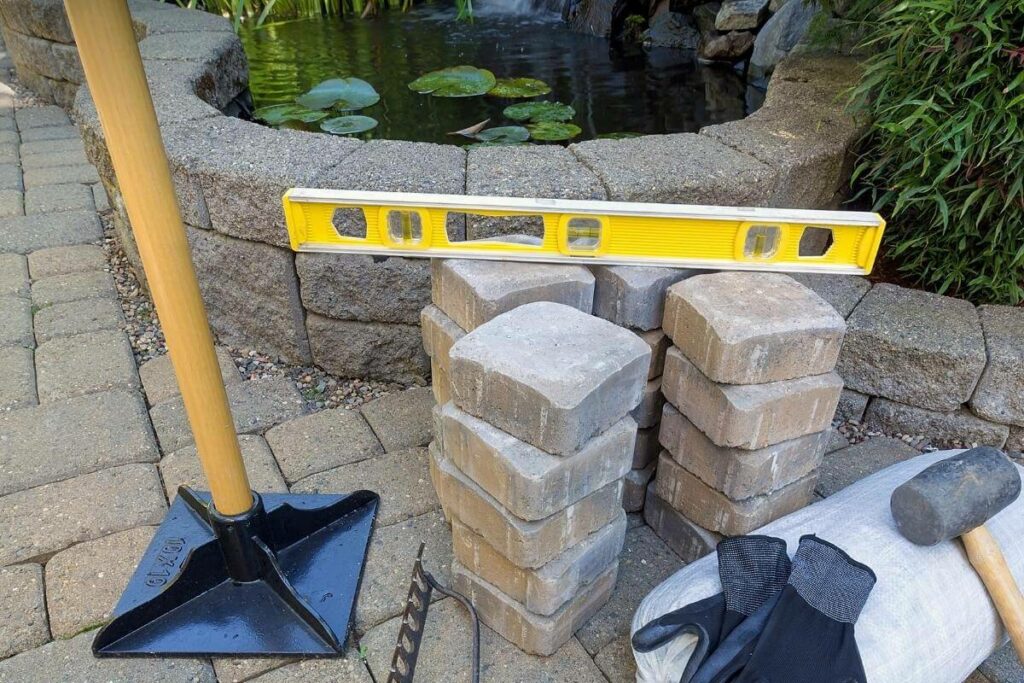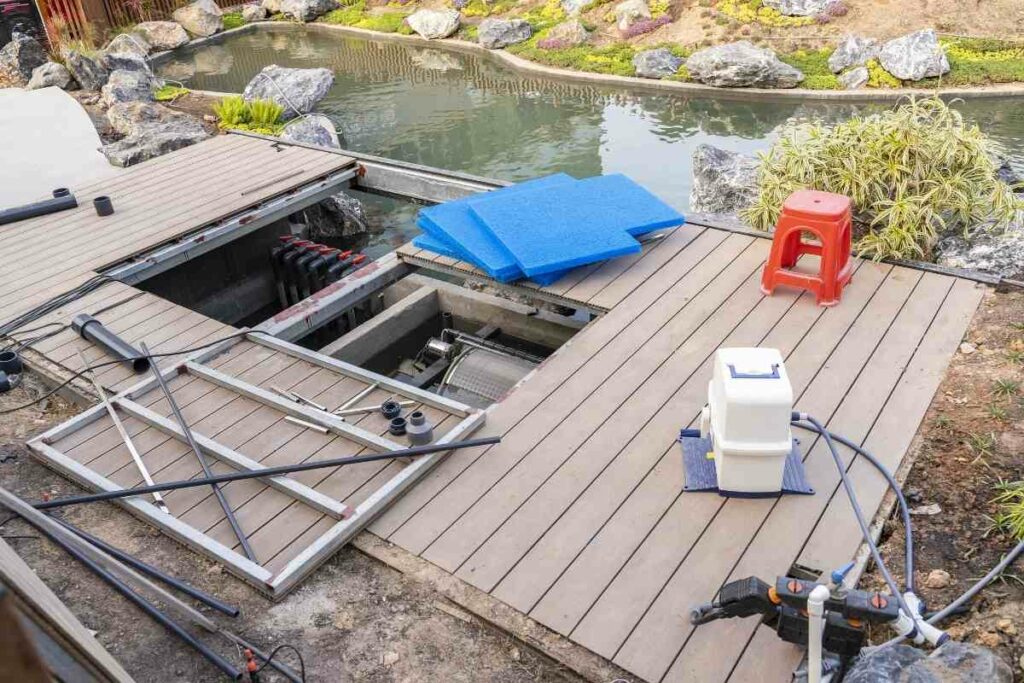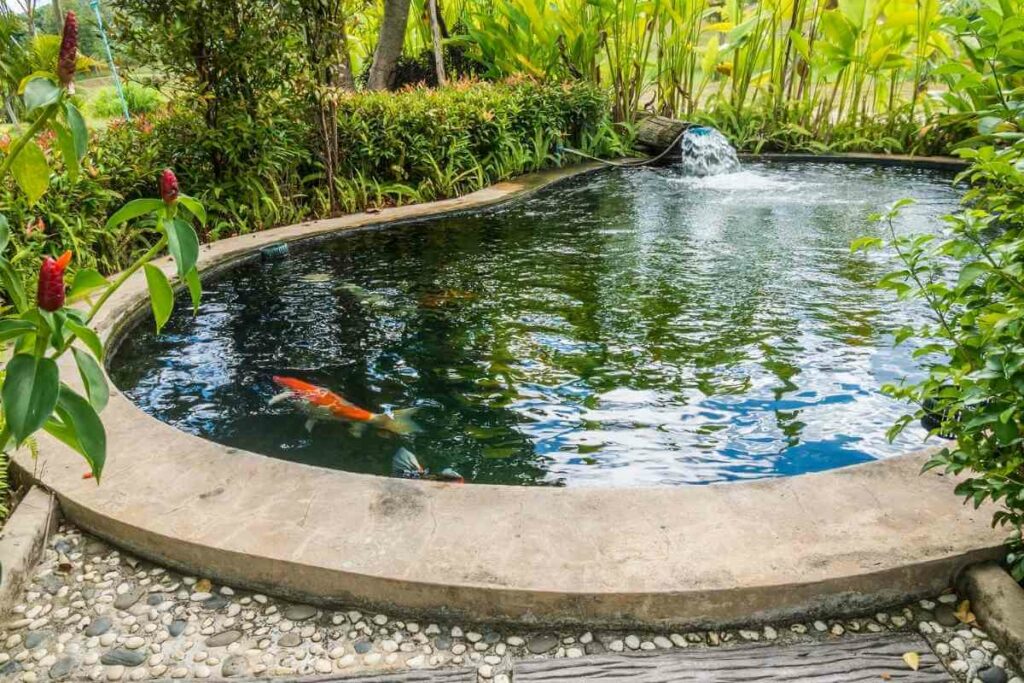Yes, you can swim in a fish pond depending on the size and cleanliness of the water. Koi fish are kept for decorative purposes, mainly in small-scale ponds.
However, if the pond is large enough and the water’s quality is observed, there is no harm in swimming in a Koi fish pond.
Expansion of the pond to 25-30 and 6 feet deep is favorable for swimming due to not destroying the Koi ecosystem or injuring the swimmer.
Unwanted bacteria such as E-Coli leaving in the Koi pond could be one of the leading factors that discourage people from swimming in the pond.

What Are The Disadvantages Of Swimming In A Fish Pond?
The main reason you should not swim in a Koi pond is that you might destroy the fishes’ ecosystem. Swimming in a small-scale fish pond will lead to some adverse effects, such as the destruction of plants in the fish pond which are vital to feed and filter the water to keep it clean.
Stepping on some fish can result in their death or damage their physical body. Interfering with their food or introducing chemicals from body applicants, perfume, or even clothes could destroy their ecosystems.
Additionally, koi ponds might contain microscopic parasites that might itch the skin. The tiny parasites are difficult to see; thus, one can consider the water safe for swimming while it is not.
Most algae are not harmful- however, others are. In most cases, the Koi fish pond is kept clean and clear to preserve aesthetic beauty.
However, if you do not regularly care for your pond, a brown-green layer of algae might form due to excess nutrients.
Swimming in a pond with algae seems unpleasant, and also, some algae release toxins called microcystin, which affects the human kidney, liver, and reproductive system.
Also, a pond with vegetation at the bottom might entangle the swimmer. Rocks that lie beneath and are not visible can be of great danger. A narrow pond could also be dangerous, especially if you love to dive.
However, the main reason you should avoid swimming in these ponds is the accumulation of bacteria.
Bacteria such as E Coli are harmful to humans. E Coli is a bacterium found in human and animal waste. It can lead to vomiting, stomach upset, and diarrhoea.
How Can One Tell If Swimming In A Koi Fish Pond Is Safe?
If the water is frequently changed or the pod has a running inlet and outlet, the pond is considered safe for swimming. Moving water is much better than stagnant water as stagnant water is home to dangerous parasites and bacteria.
You can keep the water moving by installing water pumps and fountains.
The water source is critical since it will tell you about the quality of the water. You must first investigate water from natural sources such as streams, rivers, or other water bodies as it might contain unwanted bacteria.

It is essential to check and filter the water from unknown sources if you want to swim in the pond. Artificial waters of your control are best advised than unknown water sources flowing long distances.
Water that runs through a feedlot proves that the water is suitable for swimming, for there are minimum chances of the water having bacteria.
A filtering system will filter out the gunk that will act as a food source for unwanted bacteria that settles at the lower layer of the pond.
When swimming, there is low or no risk if the water is clean and clear.
You can tell if the water is contaminated if it has an unusual color. For example, a brown, greenish, or murky look means that the water is not healthy for swimming.
If floating dead koi fish are in the pond, it is not safe to swim. This is because the fish might have been killed by contaminants present in the water. Also, decomposing fresh might release a lot of unwanted bacteria.
Always test the water for bacteria using water testing kits that check the pH levels of water and the presence of heavy metals. It is vital to test the bacteria such as E Coli, which is brought by fish waste or any other waste from the animals living in the pond.
How Can You Improve Your Koi Fish Pond To An Efficient Swimming Pond?
There are different ways you can turn your Koi pond into a safe swimming pool. For instance, you can achieve this by increasing the depth and width of the pond.
The fish pond should be at least six feet deep and twenty-five to thirty feet wide. You should also install filter systems to filter out debris and gunk to keep the water clean.
Also, ensure you keep an eye out for unwanted bacteria regularly. Each season, test the water quality if the water source is from a natural water body since different seasons have different results.
How can you clean the Koi pond without killing the koi fish?
- You can remove the algae by raking it out with a pond rake. There is no need to remove algae stuck on the rock as some are beneficial for the fish.
- Removing the thick sludge layer of organic matter beneath. The layer at the bottom is mainly made of fish droppings and rotten plants, which might contain harmful bacteria.
- You can drain the pond by use of a pump. However, this is not the best idea as you will lose the natural Eco-balance and have to start over again.
- Using a long-handled net, you can remove the floating debris.
The shape and space of the pond are also essential. Ensure it is spacious enough to make the swimmer feel comfortable and safe while swimming. Always remove rocks and other sediments that can easily injure the swimmer.

Final Thoughts
A fish pond can serve both purposes, as a swimming pond and habitat for fish, depending on the care and maintenance of the one responsible.
The most important thing to check for is the water quality and space. If the watercolor is not clean and clear or there is a production of a foul smell, then the water is not safe for swimming.
Algae is usually safe to swim in since it does not harm humans, but most people consider it gross and unpleasant.
However, if the water is checked regularly, the Koi pond is safe for swimming. Koi ponds are mostly kept clean and clear to preserve the fish’s beauty and attraction. What makes it not best to swim in is the space and to preserve the fish ecosystem.
